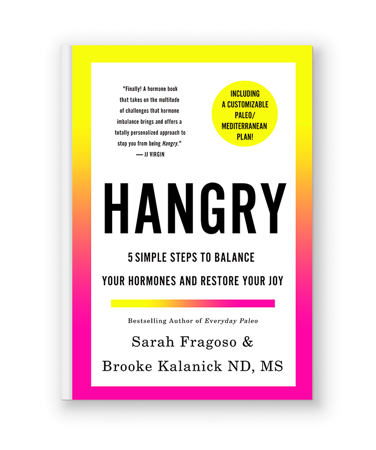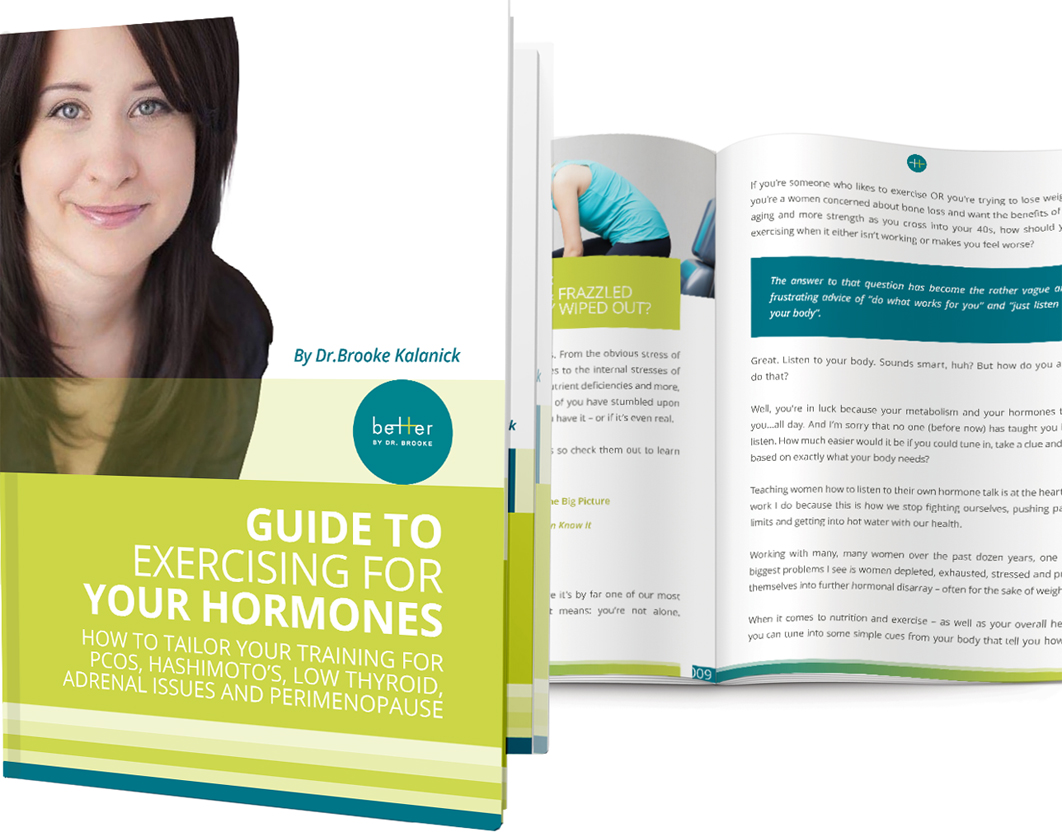
Progesterone is an important female hormone that is very calming to our nervous system and it is a perfect counterbalance to estrogen’s proliferate nature. Because of it’s counter action to estrogen it is protective to both our breasts and uteruses.
Progesterone is a pretty big deal and we definitely suffer when we don’t have enough. It’s also no fun when we have too much! I’ll talk about different types of progesterone deficiency first and then cover the more rare progesterone excess.
Like so much of your hormonal landscape, progesterone needs to be like Goldilocks: juuuust right.
Order Hangry right now!
If you’ve ever felt like a Hangry B*tch and are ready to balance your hormones and restore your joy in just 5 simple steps then Hangry is for you!
GET YOUR COPY NOW
Progesterone Basics
Progesterone is made in both the adrenals and the ovaries. This gig that takes place in your ovary is actually quite amazing.
When you ovulate, the follicle that first made estrogen and then released an egg gets sucked inside the ovary and a new organ is formed: the corpus luteum or “yellow body”. Nowhere else in the body do we form a new organ that develops a blood supply that quickly. And perhaps just as amazing, that corpus luteum only last for two weeks before it disintegrates and we start the next cycle. Yes, women are amazing!
Next to insulin, progesterone is the most common hormone associated with PCOS but progesterone woes certainly happen to women without PCOS as well.
The process I mentioned above (follicle to egg to corpus luteum) is disrupted with PCOS as we often have these faulty follicles that don’t go through this normal process leading to anovulatory cycles and thus no corpus luteum is formed. Of course, as most things with PCOS, this is not the same for every woman and some women with PCOS do ovulate but progesterone deficiency is considered a hallmark of PCOS.
What most women don’t know is that there are different types of progesterone deficiency that can happen to any woman, not just those with PCOS. And of course multiple mechanisms to low progesterone can happen within the same woman. We can become progesterone deficient due to anovulation or due what’s called a luteal phase defect.
Anovulation
Anovulation is when we don’t ovulate so the corupus luteum doesn’t form and thus it’s not there to make progesterone. This is very common problem for women with PCOS but note two things:
Some women with PCOS do ovulate, BUT they can still have low progesterone due to a luteal phase defect (more on that next).
Anovulation is common with PCOS but it may also be due to stress inducing a lack of signal from the brain to the ovaries known as Hypothalamic Amenorrhea (HA for short and means no period for 3 months). What gets dicey is that you can have PCOS and HA. Basically you can be not ovulating for two different reasons!
This is super tricky business now as the lack of ovulation is treated differently. With PCOS we need to decrease carbs, possibly decrease calories, focusing on improving insulin sensitivity to get the cycle back on track. With HA we need to focus on dialing back dieting and exercise (i.e. eating more and often exercising less) as well as minimize stress to get the period back on track.
If you’re wondering what’s up with your lack of ovulation you can get a blood test for LH (luteinizing hormone) on day 2 of your cycle. You’ll also want to get the ratio of LH to FSH (follicle stimulating hormone). This is key and I cover this in my Lab Guide For Women & Their Hormones.
Get your FREE copy of my Guide To Lab Testing & Your Hormones
This guide covers hormonal testing and thyroid patterns and will show you how to suss out the Hormonal Dealbreakers of inflammation, anemia and blood sugar problems.
Click HereIn short, LH will often be elevated in PCOS and low in HA. But know that this isn’t a perfect test and while it typically follows this pattern you can have low LH in PCOS or there may be other issues at play such as autoimmunity causing a confusing pattern. But it’s easy enough to check and can possibly shed some light for you.
As well, PCOS and HA are confusing because both conditions can show multiple cysts on your ovaries (seen via ultrasound) and both can cause elevated AMH (anti-mullerian hormone). Also if you’ve undershot your calories or carbs in effort to manage your PCOS you can create enough stress that you also induce a hypothalamic amenorrhea.
You can also worsen your insulin resistance by under-eating – confusing I know. Remember blood sugar balance is an intricate dance between insulin and cortisol and blood sugar swings are a huge source of stress.
Finding what works for you when it comes to carb intake, how often to eat and how to exercise will be key to you managing either HA or PCOS. You can check out this post about finding your Unique Carb Tolerance and be sure to listen to my recent podcast on how to exercise for your hormones.
AND be sure you pre-order my upcoming book Hangry where we teach you EXACTLY how to adjust exercise and diet for your unique hormonal issues, including low progesterone!
Luteal Phase Defect
A luteal phase defect is low progesterone that’s caused by stress or other hormonal issues. While it’s common to be non-ovulatory in PCOS that’s not always the only thing at play when it comes to PCOS related progesterone problems.
We always have to remember that we are not one hormone nor are we one hormone condition.
When we have PCOS or Hashimoto’s or adrenal fatigue (AKA HPA Axis Dysfunction) we almost always have other hormones imbalanced as well. PCOS nor any other hormone issue happen in a vacuum.
This is especially true when the imbalance is so fundamental to our entire hormone landscape such as problems with insulin or inflammation. Same is true for cortisol and adrenal issues. In the case of low progesterone and PCOS we almost always have some degree if imbalance with both insulin and cortisol.
Dr. Brooke's Guide to Exercising Your Hormones
How to tailor your training for PCOS, Hashimoto's, Low Thyroid, adrenal issues and perimenopause.
Get the Guide
Progesterone & Your Other Big Hormone Players
I call cortisol and insulin master hormones not because they are the only hormones that matter but because like thyroid, when they are out of whack even a little bit, all your other hormones are affected. And unlike thyroid, these are two that you have a ton of control over all day.
While it doesn’t feel like it sometimes we can for the most part, more often than not control what we eat, how much stress we have or at least how we manage it. All of these are areas where we can intervene and improve our insulin and cortisol balance and ultimately our progesterone deficiency.
But of course, it’s not all about just insulin and cortisol either. If you have low progesterone that can also have a negative impact on your thyroid.
As well, when progesterone is low there quickly develops a widening the gap between estrogen and progesterone creating more estrogen dominance. And remember the actions of progesterone on the brain and breasts and uterus? Now we’re seeing impact there as well.
So we can’t then assume that just because you have PCOS that the only problem is a weak or absent ovulation when it comes to inadequate progesterone. Faulty ovulation isn’t likely the only thing going on and when we only address that, we miss several opportunities to get you more progesterone and all its benefits.
So you’ve got PCOS but….
Are you also stressed? Thus creating oxidative stress and inflammation that hinders ovarian production of progesterone.
Stess is a surefire way to lower progesterone and if you have PCOS you have constant, at least low level inflammation all the time easily made worse by diet and lifestyle.
Is your oxidative stress high affecting the ovaries at the cellular level hindering their ability to make hormone? Same with your adrenals cells. When oxidative stress is afoot – and it absolutely is with PCOS – fundamental processes within a cell such as turning precursors like cholesterol into a hormone are hindered.
Or again, in attempt to improve insulin resistance or lose weight have you created a misfiring of the signals between your brain and ovaries ultimately lowering your progesterone production?
The take away here is that when we think about boosting progesterone with PCOS it’s smart to support you from all possible causes of progesterone deficiency, not just ovulation related.
TO GET LONGER LUTEAL PHASE ADDRESS OVULATION, THEN STRESS, THEN INSULIN AND THRYOID AND CORTISOL
Here’s what you can do to get more progesterone in your system naturally:
- Learn to manage stress in whatever ways work for you. Mediation is a great daily habit to cultivate a less reactive attitude. And of course you know I love me some mindset + exercise #mantrawalk (Follow me on Instagram and watch my stories to walk along with me!)
- Get enough restorative sleep.
- Be sure you’re avoiding processed foods with processed vegetable and seed oils as this is a hotbed of dietary inflammation.
- Know what foods are stressful and inflammatory for you such as sugar, gluten, dairy, etc. Need help figuring out what foods work for you? Let me help.
- Exercise appropriately for your hormones. Contact me, listen to the podcast or pre-order Hangry.
- Support that luteal phase defect and stress related low progesterone with adaptogens like ashwaganda and rhodiola.
- I love vitex or chaste tree for low progesterone and PCOS (but it won’t work for everyone).
- Address blood sugar. Have you all started finding your UCT? Insulin surges form blood sugar stress spur a loss of progesterone to testosterone. More testosterone is the last thing a PCOS low progesterone girl needs. Insulin surges also beget more inflammation.
Order Hangry right now!
If you’ve ever felt like a Hangry B*tch and are ready to balance your hormones and restore your joy in just 5 simple steps then Hangry is for you!
GET YOUR COPY NOW
To further support insulin balance and ultimately ovulation and thus progesterone:
Check out the balanced + beautiful multi which has all the insulin sensitizers. Consider adding in berberine if this isn’t helping enough.
So progesterone is rad, but can you have too much of this good thing? Yup!
When we have too much progesterone we feel bloated, can have hot flashes, get more anxious or depressed, can have difficulty sleeping and get an increased appetite. These symptoms can arise with overtly high progesterone (i.e. from topical use) or from a relatively high progesterone during the second half (luteal phase) of your period in relation to estrogen. Remember again that it’s all about balance.
Several things can create progesterone dominance: using topical progesterone cream, are under stress and the adrenals kick out too much progesterone, have a thyroid that’s out of whack, are taking the Pill or have an IUD. It can also happen in the early stages of developing a luteal phase defect.
And it’s worth noting that many, many women with PCOS are using progesterone cream or using hormonal birth control!
What To Do About Progesterone Dominance
Treating progesterone dominance – either overtly or in relation to a very low estrogen which can happen when we aren’t ovulating properly (hello PCOS!) or going through perimenopause – will depend on the cause.
When it comes to PCOS, excess progesterone may happen in the earlier stages of the condition or it can certainly happen when we’re on the Pill, using synthetic progestin IUDs (i.e. Merina, Skyla), using natural progesterone cream or have an unbalanced thyroid.
So there you have it, the many ways you end up with a progesterone problem especially when you have PCOS and hopefully some actionable things you can do today to start getting more of this important hormone. Improving ovulation quality is key but it’s not the only thing you can do.
If you need help be sure you reach out!
xo,
Dr Brooke
Dr. Brooke's Guide to Exercising Your Hormones
How to tailor your training for PCOS, Hashimoto's, Low Thyroid, adrenal issues and perimenopause.
Get the Guide
